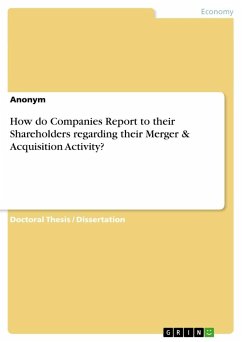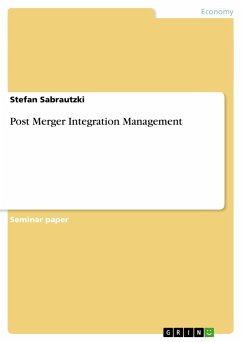Doctoral Thesis / Dissertation from the year 2008 in the subject Business economics - Investment and Finance, grade: A, Northumbria University (Business School), course: BA (Hons) Business with Finance, language: English, abstract: With the increase in companies issuing shares as a means of raising capital the way companies are monitored has changed. Incidents such as the Enron scandal serve as a reminder of directors inclination to act in an opportunistic way, with the aim to increase their personal wealth at the expense of their Companies shareholders. As a result of this Corporate Governance regulations have become more stringent in a bid to remove the agency problem, increase the transparency of organisations and protect shareholders. This dissertation looks at how six UK Plc s report to their shareholders regarding their merger and acquisition activity, to determine if they comply with the Best Practice guidelines for reporting to shareholders, laid out by academics. The 4 level of communication they provide is considered to ascertain if there is any evidence that the agency problem is still evident within organisations. Using a content analysis of the company information collected the Companies are classified into one of four classifications, depending on the level of communication that they have provided to their shareholders. The role that communication with shareholders plays, in managing shareholder expectations, is also considered when determining if the promises made to shareholders have been fulfilled. This is because acquisitions can be considered a failure by shareholders, even if all promised outcomes have been achieved, because their expectations are higher than those of the Company. Failure to manage expectations indicates that the Company is not transparent enough to the shareholders.
Hinweis: Dieser Artikel kann nur an eine deutsche Lieferadresse ausgeliefert werden.
Hinweis: Dieser Artikel kann nur an eine deutsche Lieferadresse ausgeliefert werden.








